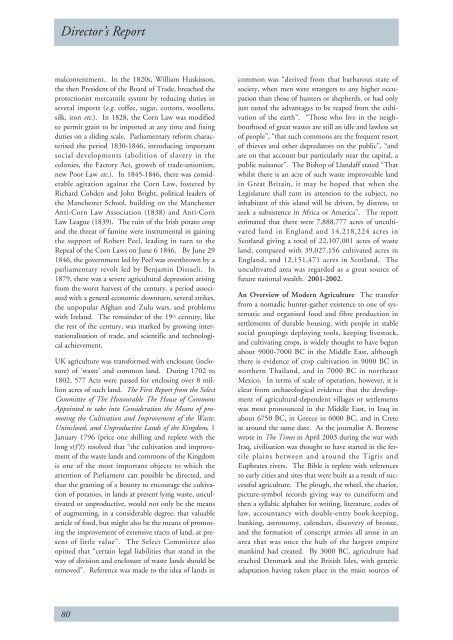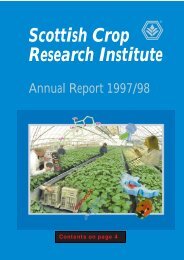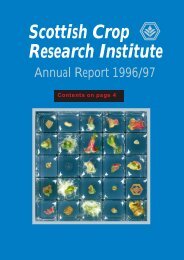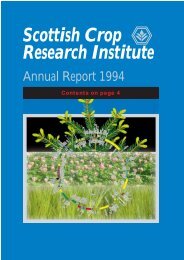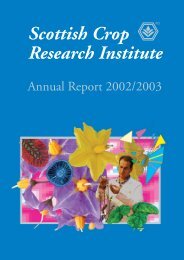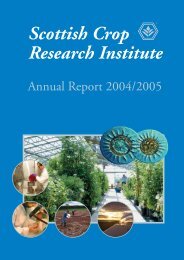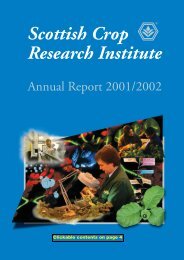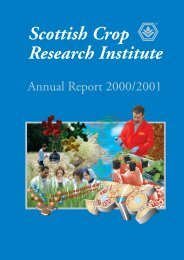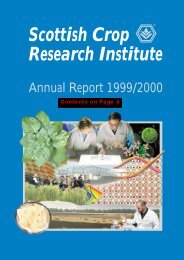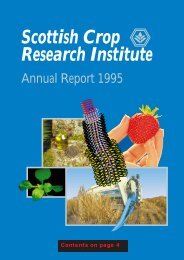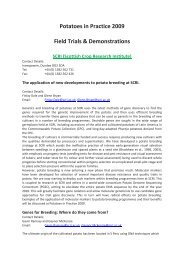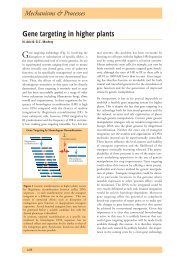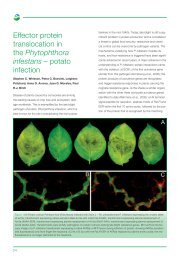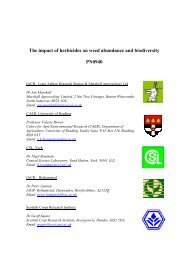SCRI Annual Report 2003/2004 - Scottish Crop Research Institute
SCRI Annual Report 2003/2004 - Scottish Crop Research Institute
SCRI Annual Report 2003/2004 - Scottish Crop Research Institute
Create successful ePaper yourself
Turn your PDF publications into a flip-book with our unique Google optimized e-Paper software.
Director’s <strong>Report</strong><br />
malcontentment. In the 1820s, William Huskisson,<br />
the then President of the Board of Trade, breached the<br />
protectionist mercantile system by reducing duties in<br />
several imports (e.g. coffee, sugar, cottons, woollens,<br />
silk, iron etc.). In 1828, the Corn Law was modified<br />
to permit grain to be imported at any time and fixing<br />
duties on a sliding scale. Parliamentary reform characterised<br />
the period 1830-1846, introducing important<br />
social developments (abolition of slavery in the<br />
colonies, the Factory Act, growth of trade-unionism,<br />
new Poor Law etc.). In 1845-1846, there was considerable<br />
agitation against the Corn Law, fostered by<br />
Richard Cobden and John Bright, political leaders of<br />
the Manchester School, building on the Manchester<br />
Anti-Corn Law Association (1838) and Anti-Corn<br />
Law League (1839). The ruin of the Irish potato crop<br />
and the threat of famine were instrumental in gaining<br />
the support of Robert Peel, leading in turn to the<br />
Repeal of the Corn Laws on June 6 1846. By June 29<br />
1846, the government led by Peel was overthrown by a<br />
parliamentary revolt led by Benjamin Disraeli. In<br />
1879, there was a severe agricultural depression arising<br />
from the worst harvest of the century, a period associated<br />
with a general economic downturn, several strikes,<br />
the unpopular Afghan and Zulu wars, and problems<br />
with Ireland. The remainder of the 19 th century, like<br />
the rest of the century, was marked by growing internationalisation<br />
of trade, and scientific and technological<br />
achievement.<br />
UK agriculture was transformed with enclosure (inclosure)<br />
of ‘waste’ and common land. During 1702 to<br />
1802, 577 Acts were passed for enclosing over 8 million<br />
acres of such land. The First <strong>Report</strong> from the Select<br />
Committee of The Honourable The House of Commons<br />
Appointed to take into Consideration the Means of promoting<br />
the Cultivation and Improvement of the Waste,<br />
Uninclosed, and Unproductive Lands of the Kingdom, 1<br />
January 1796 (price one shilling and replete with the<br />
long s(ƒ)!) resolved that “the cultivation and improvement<br />
of the waste lands and commons of the Kingdom<br />
is one of the most important objects to which the<br />
attention of Parliament can possible be directed, and<br />
that the granting of a bounty to encourage the cultivation<br />
of potatoes, in lands at present lying waste, uncultivated<br />
or unproductive, would not only be the means<br />
of augmenting, in a considerable degree, that valuable<br />
article of food, but might also be the means of promoting<br />
the improvement of extensive tracts of land, at present<br />
of little value”. The Select Committee also<br />
opined that “certain legal liabilities that stand in the<br />
way of division and enclosure of waste lands should be<br />
removed”. Reference was made to the idea of lands in<br />
common was “derived from that barbarous state of<br />
society, when men were strangers to any higher occupation<br />
than those of hunters or shepherds, or had only<br />
just tasted the advantages to be reaped from the cultivation<br />
of the earth”. “Those who live in the neighbourhood<br />
of great wastes are still an idle and lawless set<br />
of people”, “that such commons are the frequent resort<br />
of thieves and other depredators on the public”, “and<br />
are on that account but particularly near the capital, a<br />
public nuisance”. The Bishop of Llandaff stated “That<br />
whilst there is an acre of such waste improveable land<br />
in Great Britain, it may be hoped that when the<br />
Legislature shall turn its attention to the subject, no<br />
inhabitant of this island will be driven, by distress, to<br />
seek a subsistence in Africa or America”. The report<br />
estimated that there were 7,888,777 acres of uncultivated<br />
land in England and 14,218,224 acres in<br />
Scotland giving a total of 22,107,001 acres of waste<br />
land, compared with 39,027,156 cultivated acres in<br />
England, and 12,151,471 acres in Scotland. The<br />
uncultivated area was regarded as a great source of<br />
future national wealth. 2001-2002.<br />
An Overview of Modern Agriculture The transfer<br />
from a nomadic hunter-gather existence to one of systematic<br />
and organised food and fibre production in<br />
settlements of durable housing, with people in stable<br />
social groupings deploying tools, keeping livestock,<br />
and cultivating crops, is widely thought to have begun<br />
about 9000-7000 BC in the Middle East, although<br />
there is evidence of crop cultivation in 9000 BC in<br />
northern Thailand, and in 7000 BC in northeast<br />
Mexico. In terms of scale of operation, however, it is<br />
clear from archaeological evidence that the development<br />
of agricultural-dependent villages or settlements<br />
was most pronounced in the Middle East, in Iraq in<br />
about 6750 BC, in Greece in 6000 BC, and in Crete<br />
at around the same date. As the journalist A. Browne<br />
wrote in The Times in April <strong>2003</strong> during the war with<br />
Iraq, civilisation was thought to have started in the fertile<br />
plains between and around the Tigris and<br />
Euphrates rivers. The Bible is replete with references<br />
to early cities and sites that were built as a result of successful<br />
agriculture. The plough, the wheel, the chariot,<br />
picture-symbol records giving way to cuneiform and<br />
then a syllabic alphabet for writing, literature, codes of<br />
law, accountancy with double-entry book-keeping,<br />
banking, astronomy, calendars, discovery of bronze,<br />
and the formation of conscript armies all arose in an<br />
area that was once the hub of the largest empire<br />
mankind had created. By 3000 BC, agriculture had<br />
reached Denmark and the British Isles, with genetic<br />
adaptation having taken place in the main sources of<br />
80


